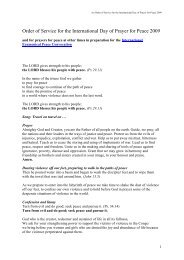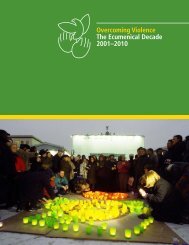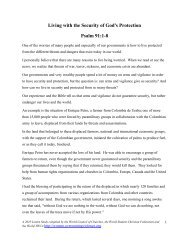Alternative Globalization Addressing Peoples and Earth
Alternative Globalization Addressing Peoples and Earth
Alternative Globalization Addressing Peoples and Earth
You also want an ePaper? Increase the reach of your titles
YUMPU automatically turns print PDFs into web optimized ePapers that Google loves.
6<br />
• Taking a faith stance when the powers of injustice <strong>and</strong> destruction<br />
question the very integrity of the gospel; confessing their faith by<br />
saying a clear “NO!” to powers <strong>and</strong> principalities;<br />
• Participating in the communion (koinonia) of the Triune God for<br />
fullness of life;<br />
• Sharing the suffering <strong>and</strong> pain of the people <strong>and</strong> the earth in company<br />
with the Spirit, who is groaning with the whole creation (Romans<br />
8:22-23);<br />
• Covenanting for justice in life together with peoples <strong>and</strong> other<br />
creatures of God; <strong>and</strong><br />
• Being in solidarity with the suffering people <strong>and</strong> the earth, <strong>and</strong> in<br />
resistance to powers of injustice <strong>and</strong> destruction.<br />
As faithful people of God, churches together become a movement,<br />
embracing spiritualities of life for the whole earth community. This implies<br />
bearing witness to the dynamic <strong>and</strong> creative Spirit of God in the universe.<br />
In each historical moment, faithfulness to such a calling requires critical<br />
self-examination. Where we are accomplices with systems of domination<br />
<strong>and</strong> injustice, we need to repent. The ministries of preaching the gospel<br />
<strong>and</strong> celebrating the sacraments can be compromised when churches are<br />
complicit with systemic injustice <strong>and</strong> the exploitation of life. In this sense,<br />
the role of the churches in the face of neoliberal globalization is not<br />
exclusively a question of prophetic ministry <strong>and</strong> social justice in the service<br />
of life. In fact, the task goes to the heart of the evangelical vocation of the<br />
churches themselves: to mediate God’s call to repent from sin <strong>and</strong> death<br />
<strong>and</strong> to embrace the reign of God <strong>and</strong> its justice <strong>and</strong> life for all.<br />
Churches are challenged to join in the struggle for justice by resisting unjust<br />
<strong>and</strong> destructive powers <strong>and</strong> by working to build an AGAPE society across<br />
religious faiths, cultures <strong>and</strong> social movements, whether the struggle is<br />
local, regional, continental or global.<br />
Faithfulness requires that we confront our fears <strong>and</strong> seek to be liberated<br />
from our captivity. Churches must be communities of hope, offering new<br />
visions of life, dispelling despair among the people <strong>and</strong> invoking the power<br />
of the renewing Spirit. Let us become, by God’s grace, the faithful<br />
communion of saints that proclaims the gospel of love <strong>and</strong> justice, <strong>and</strong><br />
jubilee for the whole earth.<br />
Throughout the world, there are people who have refused to be captured<br />
by neoliberalism; people who are finding new ways to survive the crises<br />
that the neoliberal globalization has provoked; people who have exercised<br />
the God-given right to say “no” <strong>and</strong> who have taken back control of their











